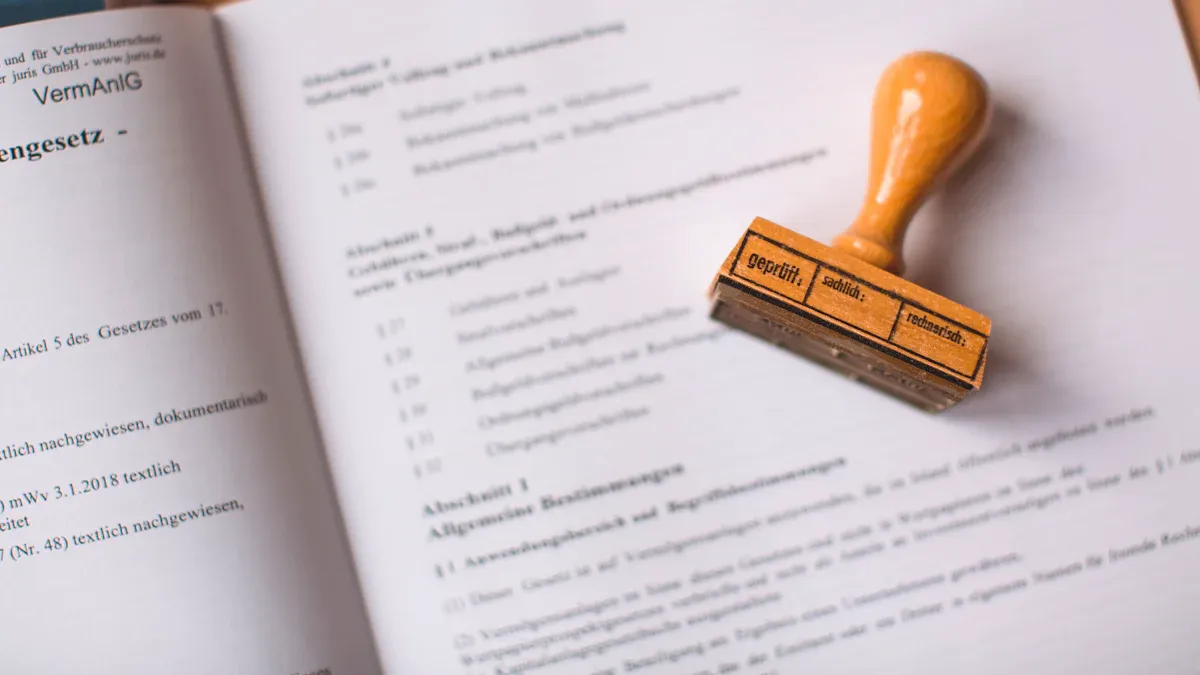Image Source: unsplash
A Power of Attorney form gives someone you trust the authority to act on your behalf. You can use it to manage financial, medical, or personal matters when you cannot do so yourself. With ‘Power of Attorney Forms: Free Templates and Legal Advice,’ this legal document ensures your affairs remain in order, offering peace of mind during challenging times.
Key Takeaways
- A Power of Attorney form lets a trusted person handle your tasks if you can’t. It helps take care of your needs in tough times.
- Free Power of Attorney templates save money and make creating important legal papers easier.
- Check your state’s rules for signing and witnesses to make sure your Power of Attorney is legal.
What Is a Power of Attorney Form?
Definition and Purpose
A Power of Attorney (POA) form is a legal document that allows you to authorize someone you trust to act on your behalf. This person, known as the agent or attorney-in-fact, can make decisions for you in specific areas, such as financial or medical matters. You, as the principal, define the scope of authority granted to the agent. This document becomes essential when you are unable to manage your affairs due to illness, absence, or other circumstances.
- A POA form outlines whether the authority is general or limited.
- It specifies the areas of responsibility, such as healthcare, property management, or legal matters.
The concept of granting authority to another person has existed for centuries. For example, 2,500 years ago in Mesopotamia, people used a similar system to allow agents to receive payments on their behalf. In 1795, George Washington used a Power of Attorney to manage his affairs while away from Philadelphia.
Common Uses of Power of Attorney Forms
You can use a Power of Attorney form in various situations to ensure your affairs are handled smoothly. Some common uses include:
- Financial Management: Assigning someone to pay bills, manage investments, or handle taxes.
- Healthcare Decisions: Allowing a trusted individual to make medical choices if you are incapacitated.
- Business Operations: Authorizing an agent to sign contracts or oversee business transactions.
- Real Estate Transactions: Granting authority to buy, sell, or manage property on your behalf.
These forms provide flexibility and security, ensuring your needs are met even when you cannot act personally. By using Power of Attorney Forms: Free Templates and Legal Advice, you can simplify the process and protect your interests.
Types of Power of Attorney Forms

Image Source: pexels
General Power of Attorney
A General Power of Attorney grants broad authority to your agent to handle your affairs. This type of POA is ideal for managing financial matters, signing contracts, or overseeing business operations. However, it becomes invalid if you become incapacitated. For example, if you are hospitalized and unable to make decisions, a General Power of Attorney will no longer be effective.
Tip: Use a General Power of Attorney when you need temporary assistance with a wide range of responsibilities but do not anticipate long-term incapacity.
Durable Power of Attorney
A Durable Power of Attorney remains valid even if you become incapacitated. This feature makes it a critical tool for long-term planning. Unlike a General Power of Attorney, it ensures that your agent can continue making decisions on your behalf during periods of incapacity.
| Durable Power of Attorney | General Power of Attorney |
|---|---|
| Remains in effect upon incapacity | Expires upon incapacity |
| Expires upon death | Expires upon death |
| Choice of agent | Choice of agent |
| Can limit decision-making | Can limit decision-making |
This distinction highlights the importance of choosing a Durable Power of Attorney for situations where decision-making may be needed during incapacity.
Limited Power of Attorney
A Limited Power of Attorney grants authority for specific tasks or a defined period. You might use this type of POA to authorize someone to sign a real estate contract, manage investments, or handle a single transaction.
- Limited timeframe: Valid only for specific dates.
- Limited scope: Covers only certain aspects, such as financial investments.
- Limited application: Restricted to a specific transaction, like selling property.
This option provides flexibility while maintaining control over your affairs.
Medical Power of Attorney
A Medical Power of Attorney allows your agent to make healthcare decisions on your behalf if you cannot do so. Each state has unique requirements for creating this type of POA.
| Requirement Type | Description |
|---|---|
| Statutory Forms | Many states require the use of specific statutory forms for POAs. |
| Notarization | Most states mandate notarization for the POA to be valid. |
| Witness Signatures | Some states require one or more witnesses to sign the POA document. |
Understanding your state’s requirements ensures that your Medical Power of Attorney is legally valid.
Financial Power of Attorney
A Financial Power of Attorney focuses solely on financial matters. It enables your agent to manage your bank accounts, pay bills, file taxes, or oversee investments. This type of POA is essential for ensuring your financial stability when you are unavailable or unable to act.
By understanding these types of Power of Attorney forms, you can choose the one that best suits your needs. Using Power of Attorney Forms: Free Templates and Legal Advice can simplify the process and help you make informed decisions.
Choosing the Right Power of Attorney Form
Identifying Your Needs
Choosing the right Power of Attorney form starts with understanding your specific requirements. Every situation is unique, so you need to evaluate your circumstances carefully. Consider the following factors:
- Your current and future needs, such as financial management or healthcare decisions.
- Your personal preferences regarding how much control you want to delegate.
Power of Attorney Forms: Free Templates and Legal Advice
Online Resources for Free Templates
Finding reliable online resources for Power of Attorney forms can save you time and effort. PandaDoc is one of the most trusted platforms for accessing free templates. It offers a variety of verified forms, ensuring you avoid potential fraud. These templates are easy to customize and cover different types of Power of Attorney, such as financial or medical. By using a trusted platform like PandaDoc, you can confidently create a legally sound document.
When searching for templates, always verify the source. Look for platforms that provide clear instructions and legal compliance. This step ensures your form meets your needs and adheres to state laws.
State-Specific Power of Attorney Forms
Each state has unique requirements for Power of Attorney forms. Understanding these differences helps you create a valid document. Here are some key variations:
- Types of Power of Attorney: States may differ in how they define general, durable, financial, and healthcare POAs.
- Notarization Requirements: For example, California requires notarization for financial POAs, while Florida mandates notarization and two witnesses.
- Language Differences: Texas requires specific wording for gifts, while New York uses a Statutory Short Form.
- Filing Rules: Some states require filing for real estate transactions, while others do not.
Review your state’s laws before completing your form. This step ensures your Power of Attorney remains enforceable.
Nonprofit Organizations Offering Free Legal Forms
Nonprofit organizations often provide free Power of Attorney forms to help individuals in need. These groups aim to make legal resources accessible to everyone. Many nonprofits also offer guidance on filling out the forms correctly. This support can prevent common mistakes, such as misunderstanding POA types or neglecting updates.
Local legal aid organizations and national groups like Legal Aid Society often provide these services. You can also find resources through community centers or online directories. Using nonprofit resources ensures you receive accurate and legally compliant forms without incurring high costs.
Legal Considerations for Power of Attorney Forms
State Law Compliance
Each state has unique laws governing Power of Attorney forms. To ensure your document is legally valid, you must meet these state-specific requirements. For example:
- Use the correct language and follow the execution procedures outlined by your state.
- Stay informed about legislative changes, as these laws can change frequently.
- Consult legal experts to confirm compliance with your state’s regulations.
Failing to follow these rules can lead to disputes or render your document unenforceable. Taking the time to understand your state’s requirements protects your interests and ensures your Power of Attorney form serves its purpose.
Notarization and Witnessing
Notarization and witnessing are critical steps in creating a valid Power of Attorney. Each state has distinct requirements for these formalities. Some states require notarization, while others mandate witness signatures or both. These steps ensure the document reflects your intentions and meets legal standards. Skipping these requirements can compromise the enforceability of your Power of Attorney. Always verify your state’s rules to avoid complications.
Revoking or Updating a Power of Attorney
You may need to revoke or update your Power of Attorney as circumstances change. Follow these steps to ensure the process is legally sound:
- Create a new Power of Attorney document that explicitly revokes the previous one.
- Destroy the original document to prevent misuse.
- Submit a notarized written statement of revocation to your agent and any institutions involved.
- Notify all parties who received a copy of the original document.
Regularly reviewing and updating your Power of Attorney ensures it remains effective and aligned with your current needs.
When to Seek Legal Advice
Certain situations call for professional legal guidance when creating a Power of Attorney. For instance:
- If you plan to travel abroad, appointing an agent ensures your affairs are managed in your absence.
- As you age, a Power of Attorney can help manage your assets and healthcare decisions.
- High-risk occupations may require a Power of Attorney to handle financial matters in case of emergencies.
- Designating a family member as your agent can simplify decision-making for real estate or other matters.
Seeking legal advice in these scenarios ensures your Power of Attorney is tailored to your needs and legally compliant.
By addressing these legal considerations, you can create a Power of Attorney that protects your interests and avoids potential disputes. Using Power of Attorney Forms: Free Templates and Legal Advice simplifies the process while ensuring your document meets all necessary requirements.
Power of Attorney forms play a vital role in managing your affairs during incapacity.
- They allow a trusted individual to act on your behalf, ensuring your needs are met.
- Free templates save money, simplify the process, and provide quick access to essential legal documents.
Always consult a legal professional to ensure compliance and protect your interests.
FAQ
What happens if I don’t notarize my Power of Attorney form?
Notarization ensures legal validity. Without it, your form may not hold up in legal or financial institutions. Always check your state’s requirements for notarization.
Can I have multiple agents under one Power of Attorney?
Yes, you can appoint multiple agents. Specify their roles clearly to avoid conflicts. For example, one agent can handle finances, while another oversees healthcare decisions.
How do I revoke a Power of Attorney?
Create a written revocation document. Notify your agent and institutions involved. Destroy old copies to prevent misuse. Consult a legal expert for additional guidance.
💡 Tip: Regularly review your Power of Attorney to ensure it reflects your current needs and preferences.
